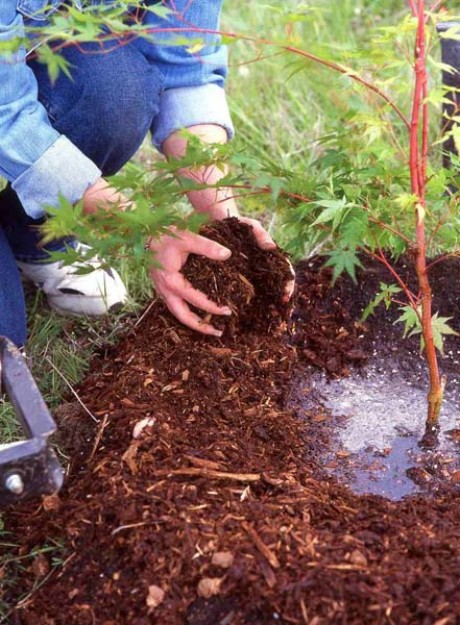Protect and enrich your plants
Mulch is a multi-tasker for your yard and garden
By Kris Wetherbee
Covering the ground with mulch is a quick and easy way to protect and enrich the beauty and health of your garden plants and overall landscape. In fact, mulch can make the difference between a plant that thrives and one that dies.
"North Carolina experiences wide weather fluctuations, which can dramatically affect plants," says landscape designer Mark Sanborn. "Mulch keeps temperatures around the roots of plants cooler in the summer and more stable in the winter. Mulch also keeps moisture in, discourages weeds and builds up soil as it decomposes."
Most any type of organic or inorganic material that you spread or lay on top of the soil is referred to as mulch. Here are common organic mulches.
Bark, chipped or shredded, is best used around trees, shrubs and perennial beds. It's durable, attractive, stays in place and decomposes slowly; however, large chips may be difficult to work with.
Aged wood chips and shavings are best for perennial beds and garden paths; both offer the same benefits as bark. Do not use chips from pressure-treated wood.
Compost is rich in nutrients and ideal for vegetable and ornamental beds. It holds in moisture while protecting against plant diseases, though it may contain weed seeds.
Grass clippings can be spread on new beds as well as vegetable and ornamental beds. One plus is that it's readily available. It also improves the soil and quickly decomposes for a summer mulch. Use only unsprayed clippings.
Well-rotted manure, a.k.a. "aged manure," is great for vegetables. It feeds and improves the soil and keeps it moist. Avoid fresh manure as it may burn or even kill tender plants.
Leaves make a nice mulch for ornamental and vegetable beds as well as winter cover. They improve the soil and provide winter insulation. Always shred leaves before using.
Pine needles function best as a winter cover for ornamental beds and shrubs. They're moisture retentive, lightweight, weed-free, a soil improver and intoxicatingly fragrant, though not always available. Dry pine needles are also flammable.
Straw and hay should be reserved for vegetable beds and as a winter cover. They're inexpensive, lightweight insulators, but they may contain weed seeds, can be flammable, and are not very ornamental.
About the Author
Oregon writer Kris Wetherbee who specializes in the areas of gardening, food and outdoor living, wrote these articles. Added sources include Mark Sanborn Landscaping Co., based in Raleigh.-
Share this story:



